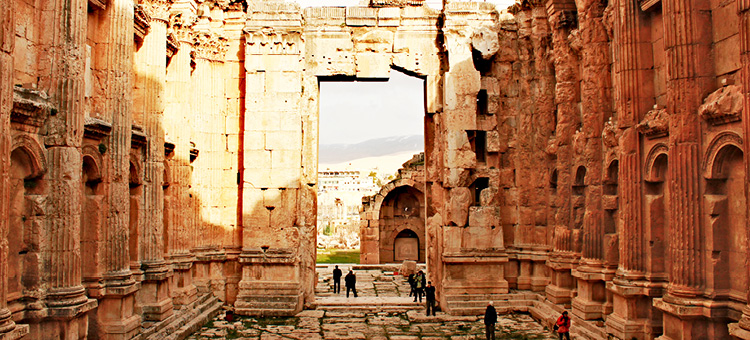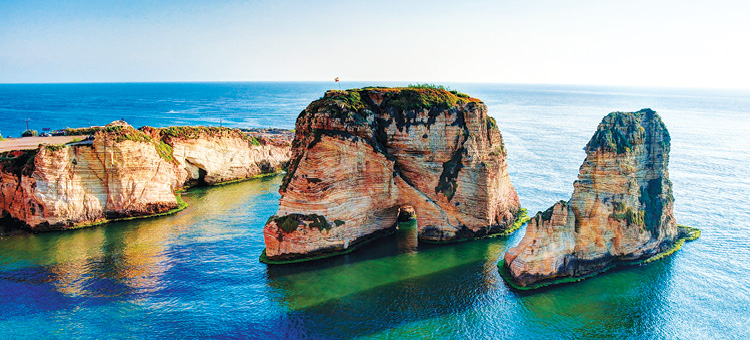Beirut: Lebanon is a paradise yearning to be discovered. A country with a chequered history, Lebanon has a population of around five million. A Mediterranean seafront city of about 2.2 million people, Beirut, the capital of Lebanon, has been home to Phoenicians, Greeks, Romans and Arabs. The last century alone witnessed momentous events involving the Ottomans, the French, the Palestinians, a 15-year civil war, a bloody battle between Israel and Hezbollah, and a large refugee influx from neighbouring Syria. Bullet-peppered walls and shrapnel markings on buildings resembling graffiti from the scars left behind by the ravaging Civil War, which ended in 1990.
The past 10 years have been marked by intense turmoil. Tourism in Lebanon was hit hard by insecurity and regional instability, causing the number of tourist arrivals to drop from 2.17 million in 2010 — considered one of the golden years for tourism in Lebanon — to 1.5 million in 2015, though a tourist bump at the fag end of 2016 brought numbers back up to 1.7 million. Tourism in Lebanon is resilient, and as history testifies, the minute a crisis is resolved, hotel rooms are booked out and the streets spring back to life. Globally, Lebanon is ranked 35 among the 185 countries in terms of tourism sector’s annualised growth rate for the 2017-27 period and is in the 33rd place in terms of the expected growth of the sector’s direct contribution to GDP over the same period.
“With a 200-km-long coastline and around 300 days of sunshine a year, Lebanon is the land of leisure tourism. Contrary to unsettling stories that a section of the media propagates, Lebanon is one of the most secure places in the Middle East. People belonging to different faiths coexist in harmony,” says Avedis Guidanian, Minister for Tourism. “Post the Holy Month of Ramadan in June, months of July and August should see a lot of action. Lebanon holds a unique appeal for Gulf Cooperation Council (GCC) nationals. Tourism depends largely on the Lebanese expats who make a beeline for the country in summer. And these expats contribute substantially to the economy,” he says.
The World Travel & Tourism Council (WTTC) revealed that the travel and tourism (T&T) industry had directly contributed $3.4 billion to the Lebanese economy in 2017, about 7.1 per cent of the GDP, against 10 per cent in 2010. It also found that direct industry employment will reach 1,23,800 persons in 2017, 6.9 per cent of total employment generated. It expects the sector’s direct contribution to the economy to grow by 2.9 per cent in real terms in 2017, and its direct contribution to employment to remain unchanged year-on-year.
“For the past 50 years, Lebanon has been reliant on the GCC market for tourism. And this is normal, whether in Lebanon, Europe, or America; it is called proximal tourism. This does not mean that we are ignoring markets like Europe, India, Russia and China. But these markets demand stability in Lebanon and hence we need to evolve a long-term strategy,” states the Minister. Russian tourists, who till now favoured Turkey, have started to throng the virgin beaches of Lebanon. While there are a few beachfront resorts, it is not enough to cater to the spurt in demand. What is needed today are beach resorts in prime locations such as Beirut, Jounieh, Byblos and Batroun – at least 3,000 seafront rooms.
The Ministry of Tourism recently launched ‘Rethinking Lebanon 2025’, a campaign to craft slogans that reflect Lebanon’s identity. As part of the campaign, Lebanese people from across the globe have been invited to come up with creative slogans that reflect Lebanon’s cuisine, night life, hospitality, etc. The slogan is meant to promote ‘brand Lebanon’ on the international stage. The competition aims to engage and challenge Lebanese youth all over the world to help create a virtual community to revive patriotic feelings and a sense of belonging among the Lebanese people.
“‘Visit Lebanon’ aims to develop the leisure and MICE markets. In May 2018, we will also start rolling out our Digital strategy by publishing the leisure and MICE brand websites”, says Avedis Guidanian. Nadim-Georges Freiha, Founder, Globe Network, the company tasked with the promotion of ‘Visit Lebanon’ campaign globally, says, “One of our objectives for 2018 is to tap the Indian market. As a first step, we will conduct B2B meetings with tour operators, MICE agencies and wedding planners through targeted roadshows and workshops in some of the main Indian cities.”
Although no single market can replace the Gulf tourists, the tourism sector in Lebanon is developing alternative markets (Europe, India, China and Russia) and new revenue streams (beach tourism, medical tourism and religious tourism) to try and make up for the dwindling number of visitors from the Gulf. “We have set up a centralised office for ‘Visit Lebanon’ in Europe, which covers the whole world through a specialised network. If necessary, we will appoint a representative or open an office exclusively for the Indian market. But for the time being, our local partners are a great support. At present, we are working closely with the Ministry of Tourism to put in place a quick visa delivery system,” concludes the Minister. For all the famed stories of Lebanon’s chequered past, its bewitching beauty and genuinely warm people, Lebanon is a treasured secret that begs exploration.






